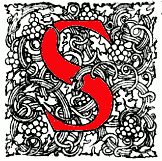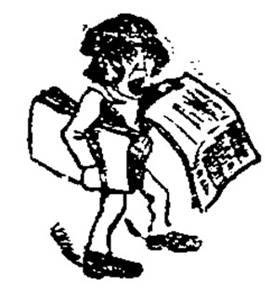This article has been transcribed from a copy of the Cardiff Times in the online collection of scanned Welsh newspapers 1804-1919 in the National Library of Wales, with grateful recognition of the free access accorded to all readers.A decorative initial has been added, and where necessary paragraph breaks have been introduced for easier reading.

amuel casts a scornful eye on the would-be fashionable people who promenade in Cardiff on a Saturday in order to display themselves. It is an ‘imposing’ display, which seeks to impose on fellow citizens. His attitude implies that he is socially superior to them all. In accusing them of snobbery and scorning new wealth, he is, of course, revealing his own snobbery, not to mention his antisemitism. To today’s reader he is probably at his worst in condemning domestic servants who dress like their ’betters’ – something noticed everywhere for much of the century, and now, perhaps, easier to achieve because of mass-produced clothing, although wearing ‘hand-me-down’ dresses from employers, is the source of most fine clothing for maid-servants, who were often very skilled at adapting and updating secondhand clothes. He claims to be willing to follow new fashions like creases in trousers and turn-ups. He is at his liveliest in rendering the passing snatches of ‘choppy’ conversation. Much of the reported language is more Yorkshire than Cardiff. — David Skilton
I HAVE become socially ambitious lately, sir; I have resolved to no longer conceal my personality; I have determined to take up that elevated position in Cardiff to which my great talents and many personal charms entitle me. So, sir, I shall in future mingle with the fashionable throng. I shall dawdle and dangle where the aristocracy of the town most do congregate. With a view to making an imposing show — an eminently ‘imposing’ show – in the haunts of the grand array of beauty and fashion ever to be found in Cardiff, I have made certain little preparations as to my outward man. For instance, I have made arrangements for having my trousers regularly creased in front and behind, and I have purchased a pair of gaiters, which, as I am told, cannot be dispensed with by any man who would be thought a member of the ‘best set.’ That latter expression, ‘best set’ by the way, rather makes one feel as though one were a part of a seldom-produced china tea service. Of course I shall, in imitation of other men of taste and breeding, turn up the bottoms of my trousers, even in hot, dry weather. This is en regle – and it shows – off one's gaiters to advantage. Gaiters have many merits, sir; they hide cracks in your boot uppers – all ‘swells’ know that – and besides, you can wear your patent leather slippers with them when you[r] boots are being newly soled, and no one is the wiser. Then again, I have purchased a short yellow “Chesterfield” — I think that is the name. I bought it second-hand, and the dealer who sold it to me said that although it was a Chesterfield, he had got a New-market for it, and that it was the ne plus Ulster of fashion. He also said that it was a ‘dust’ coat. I gave it to the men who shake our carpets to operate on, and they said it was a dust coat also. When they shook it and beat it with sticks, people thought there was a fog on, the dust was so thick. It is a short Chesterfield – one of the sort that makes you think that the tailor has fallen short of material after taking the order. But short overcoats are fashionable. The gilded youth wear them in order that the tails of their dark under-coats may show from beneath. The effect is most elegant, but a regard to beauty is not the primary reason for this arrangement — the real idea is to show that you have got an under-coat, even if you have left your waistcoat at home – or somewhere or other. Of course I have gone in extensively for gloves — I bought two odd ones, both ‘lefts,’ in fact; but that won't matter, for I shall only wear one glove, and stick the other one, a la mode, between two of the buttons of my overcoat. You will please note that although these gloves are of dogskin, there is a good deal of ‘kid’ about them. I flatter myself that but few can beat me in the way of collar and cuff, sir, but I take care not to take my coat off when I am asked to wash my hands anywhere, for my collar and cuffs are what are known as ‘false—uns.’ I am pretty well equipped, you will see, for conquest in fashionable circles.

Smirker, Junior
By way of experiment, and in order to test the power of my attractions, sir, I last Saturday morning betook myself to promenading in that happy hunting ground of fashion of the ‘upper suckles’ of local ‘sassiety’ — to wit, sir, that select thoroughfare, St. Mary-street, which is to Cardiff what Regent-street is to the great metropolis. Of course you have been in St. Mary-street on a Saturday forenoon, sir? If not, you have not yet lived; in fact, you don't deserve to live. It is a sight to make ambitious thoughts swell within one; a sight to spur one on to noble deeds, the outcome of which is that one may ultimately acquire a comfortable balance at one’s bankers, and go shopping in the said street on a Saturday morning. What, now, can plant in one’s bosom a finer feeling of emulation than the opportunity of gazing upon young Smirker, the prosperous merchant's son? Smirker fires one's soul with ambition. Everyone knows that he is not clever – but does not that very fact teach people of moderate attainments to be self-reliant? It is a glorious ambition for a man to think that he can make money like old Smirker, and have a son who never does anything for a living, like young Smirker, and daughters like the Misses Smirker, who can, after their ‘finishing’ course at a first-rate school, successfully mince their native English. (I don't suppose they could do anything so vulgar as mince veal — and call a ‘club’ a ‘clab,’ ‘yes ‘ya--a-as,’ and ‘no’ ‘now’ – especially when it is considered that Smirker pere talks about his ‘bit o'brass.’ The Misses Smirker are quite at home in St. Mary-street, though they do sometimes get jostled by rude young business men, who are running off to the banks before the latter close. I repeat, sir, that it is a great thing to have a son like young Smirker, who can spend his Saturday mornings in St. Mary-street, wearing out the brims of ever so many new hats per year in consequence of the profuse manner in which he is obliged to ‘doff’” to his high-born acquaintances.

‘Still Disengaged.’
It is a charming sight altogether is St. Mary-street on a Saturday morning. You will perceive that most of the ladies, especially the young ones, glance into the shop windows as they pass. The tradesmen – particularly those who go in for profusion of mirrors – will tell you that the same ladies are not necessarily fixing their gaze upon the goods displayed, but rather upon their own figures as reflected. Very charming, some of these young ladies, but the only wonder is, how on earth most of them will ever manage to find husbands in these days of youthful male cynicism, heavy rates, and reduced salaries. There are plenty of celebrated male butterflies — such as young Longlegs (whose father was somebody or other, but who has no personal recommendation whatsoever otherwise, save a skilful yet long-suffering tailor); Howler, the distinguished amateur vocalist, who endeavours to look as ‘professional’ as ever he can; young Abraham Levi Vatembeim, who of course isn't a Jew, though his nose is rather Mosaic; Montmorency Fitzcockles Tinrib, of lawn-tennis fame, and Stuffler, whose recitations are so indubitably tragic. All these are non-marrying men, sir, though they are so polite to all the ladies they meet, and though they know (as they would in confidence tell you) that nearly all the girls ‘fancy’ them greatly.

Beauty
A tax ought certainly, in my judgment, to be levied on such pernicious young men. They somehow escape the payment of income tax (for reasons connected with the limited extent of their income, perhaps), but they might at least pay a species of bachelor tax. I must not, whilst speaking of them, omit all mention of young Bow-wow, a gentleman who might at first sight be taken for a groom, judging him by his snaffle pin, his tight unmentionables, and his generally ‘horsey’ get up. Although he frequently wears spurs and carries a riding whip, no one I have had the pleasure of meeting ever saw him on horseback. He always has the bewitchingly pretty dog pictured in the annexed illustration with him; from its strong resemblance to Bow-wow himself, it is said that he cannot forego the pleasure of making him [?] his most constant Companion. I may say that some good-natured people will refer to the twain as ‘beauty and the beast.’ I enjoyed myself famously, sir, strolling amongst the gay throng last Saturday forenoon. I noticed that not quite all the attractive young ladies were of the genuine ‘Pa’-has-got-money, do-nothing order. Some damsels were there present of that class which does not like to own that on ordinary days it cleans the window, burnishes the fire-irons, and washes ‘Johnny’ ready for school, but which only cares to be seen in its Saturday morning or ‘prepared – to receive – visitors,’ aspect.

‘Orrible outrage in London.’
Newsboys selling papers containing a report of the latest horrible murder or full, true, and particular accounts of the latest ‘scandal in high life’ are but little in evidence with their howls and yells in St. Mary-street, therefore is it possible to overhear some most edifying scraps of conversation indulged in by the passers-by. Of course it is not quite as easy to overhear the ladies as the gentlemen, inasmuch as the crinolettes of the former keep one at a certain distance, but, if any of your readers should try the experiment in the case of both sexes, they will probably be the hearers of some such olla podrida as the following:— ‘Isn’t she a fright?’ ‘What, going to marry him?’ ‘Both the front ones are false;’ ‘Picked them up at Weston last summer;’ ‘What a nose she has:’ ‘Wore it all last winter;’ ‘She was grown up when I was at school;’ ‘He's an old “hunks,” [surly old skin-flint] and the firm is very shaky;’ ‘You know it's old Mrs Gewgaw, whose husband ran away with ——;’ ‘Miss Tracts, one of the Rev Soaper's flock;’ ‘Will you go with me to –?’ ‘He never wore a –;’ ‘Polonaise;’ [‘]trimmed with maroon;’ and so on, sir. Successful Cardiff, sir, and that portion of the society of Cardiff which would gladly be thought successful, is to be seen in all its glory in St. Mary-street on a Saturday morning. I intend to become a regular member of the crowd, in order that I may cultivate the fashionable style of ‘choppy’ conversation, and that outer aspect of limp indifference to anything or anybody which is the characteristic of the regular male habitu[é] — and after that I think I shall endeavour to qualify for the Town Council, or the Board of Guardians, or the School Board, or for one of the other posts of high distinction and honour which are the reward of successful citizenship in Cardiff. Who knows but that some day even my statue may be added to the other sights of the town?
Last modified 2 December 2021